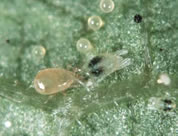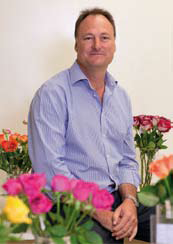 Airflo is a known and respected brand amongst Kenya’s flower growers. Will it soon disappear given Panalpina’s acquisition of the company?
Airflo is a known and respected brand amongst Kenya’s flower growers. Will it soon disappear given Panalpina’s acquisition of the company?
Conrad: The new entity will be called Panalpina Airflo, so Kenya’s flower growers will still encounter the brand name, but more importantly they will still experience everything it stands for. Our customers will continue to receive the quality service that they are used to. In addition, they’ll also benefit from Panalpina’s global reach and expertise.
Colin: Conrad is right. Everything is being maintained—including more than 160 staff in Nairobi and Aalsmeer with their expertise and dedication. Airflo’s infrastructure, processes and attention to detail are also being preserved. Airflo’s legacy will definitely live on and Panalpina is bringing new ideas and people to the table.
What exactly do you mean by that?
Colin: A big benefit for customers is that Panalpina is great at connecting people and companies anywhere in the world, not just in Kenya and the Netherlands. Panalpina Airflo will help Kenyan growers to make the most of the worldwide opportunities available to them. The UK is an interesting market for example. The two companies combined can tailor-make solutions to fit individual customer needs for the UK. Together, we have a combined knowledge at product origin and product destination.
Conrad: Panalpina’s global reach and ability to network are definitely major advantages for our customers. Panalpina Airflo will bring different stakeholders to the table, in a way that is beneficial to everyone. We can connect growers with importers and exporters with growers. As one of the world’s biggest air freight users, Panalpina also has excellent relationships with the airlines. After all, Panalpina’s global annual airfreight volumes are many times those of Airflo.

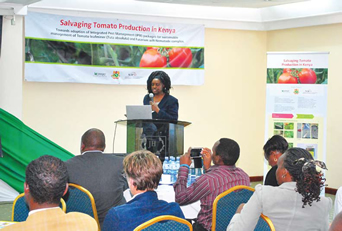
 Everyone around the world knows the tender feel and sweet smell that comes when you get in contact with a flower. Maintaining the quality of these gentle plants that bring color to our lives is an important aspect in all in the flower business. Kenya’s Floriculture Industry has currently embraced the importance of post harvest. A shift is noticeable from the perception that quality is only achieved from the field, with the current thinking being the need to maintain the quality even after harvest’ which is helping farmers have a higher bidding price at the market level. Losses at the post-harvest chain are more severe because they represent waste/loss of human effort, farm inputs and all other resources involved during production.
Everyone around the world knows the tender feel and sweet smell that comes when you get in contact with a flower. Maintaining the quality of these gentle plants that bring color to our lives is an important aspect in all in the flower business. Kenya’s Floriculture Industry has currently embraced the importance of post harvest. A shift is noticeable from the perception that quality is only achieved from the field, with the current thinking being the need to maintain the quality even after harvest’ which is helping farmers have a higher bidding price at the market level. Losses at the post-harvest chain are more severe because they represent waste/loss of human effort, farm inputs and all other resources involved during production.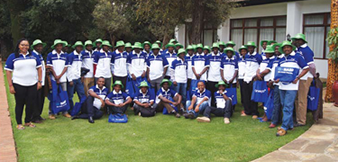
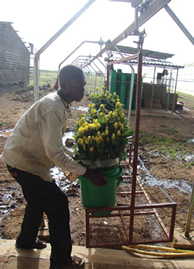 Operating a business in a developing country is not always for the faint of heart. But new research suggests that long-term relationships between buyers and sellers can go a long way toward overcoming obstacles like political instability and weak governing institutions.
Operating a business in a developing country is not always for the faint of heart. But new research suggests that long-term relationships between buyers and sellers can go a long way toward overcoming obstacles like political instability and weak governing institutions.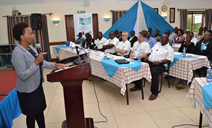 After climbing one great hill, one only realizes that there are many more mountans to climb. This old adage attributed to one of African great rings true in agrochemicals. The past few decades have seen the rise and spread of different diseases in greenhouse farming. One man has seen it all, Mr. Anthony Songoro, Crop Manager, Floriculture and Industrial Crops Bayer Crop Science a trained horticulturalist with both agrochemical and production experiences. Before joining Bayer Crop Science two years ago, he was a grower for seven years. Mr. Songoro prides himself with a wealth of experience in biologicals. To many he is a guru in the flower industry. Recently, Floriculture Magazine caught up with him after giving the key presentation in Luna Tranquility Launch and in a relaxed atmosphere, he gave an interesting interview, Excerpts.
After climbing one great hill, one only realizes that there are many more mountans to climb. This old adage attributed to one of African great rings true in agrochemicals. The past few decades have seen the rise and spread of different diseases in greenhouse farming. One man has seen it all, Mr. Anthony Songoro, Crop Manager, Floriculture and Industrial Crops Bayer Crop Science a trained horticulturalist with both agrochemical and production experiences. Before joining Bayer Crop Science two years ago, he was a grower for seven years. Mr. Songoro prides himself with a wealth of experience in biologicals. To many he is a guru in the flower industry. Recently, Floriculture Magazine caught up with him after giving the key presentation in Luna Tranquility Launch and in a relaxed atmosphere, he gave an interesting interview, Excerpts. Founded in January 2013, Fresh From Source (FFS) is becoming a well-known young company in the flower industry. With our experienced team based in the Netherlands with representativesin Kenya, (Nairobi) and Zimbabwe (Harare), we are able to supply fresh flowers from Africa all over the world.
Founded in January 2013, Fresh From Source (FFS) is becoming a well-known young company in the flower industry. With our experienced team based in the Netherlands with representativesin Kenya, (Nairobi) and Zimbabwe (Harare), we are able to supply fresh flowers from Africa all over the world.